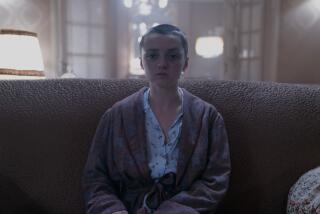Abused ‘Justine’ Lacks Sade’s Energy
- Share via
No virtuous heroine ever had worse luck running into strangers than Justine, whose horrendous adventures were chronicled with exquisite perversity in the novel by the Marquis de Sade. As adapted and directed by Leon Katz for the stage, “Justine, or the Misfortunes of Virtue” is now a lugubriously arty, short vault not so much into the wonderfully miscreant mind of Sade as into the agonies of his much-abused heroine, who had remained so much a blank in the book.
Suddenly orphaned and poor, Justine is thrown to the world. No matter who she meets--a traveler whose life she saves, four pious monks--she is sure to be promptly raped and beaten in a most creative fashion. Sade created a comic mirror through which to counter common 18th century beliefs about the rewards of virtue and honor. Like Nietzsche, he believed conventional morality was herd thinking, and he meticulously created the world as he saw it--a world where only vice and duplicity and cruelty triumphed, and he did it with a wicked appreciation of the humor in grotesque exaggerations.
And though Sade’s philosophy makes its way into this drama, at the Evidence Room in Culver City, his energy and humor do not. To recount the unbelievable tortures of Justine, a troupe of seven actors wear nothing but sober expressions, white Lycra body suits and an occasional cape and mask.
Justine, played by Sue Turner-Cray, exhibits a Kim Basinger-esque placidity that is routinely interrupted by the moaning, writhing and pleading required by the part. Her agonies are enacted in sparse, gymnastic ballets (movement by Debra DeLiso), and her suffering is set to ominous, non-melodic music by Peter Golub. The heroine’s tortures are also narrated by a disembodied voice (Katz), which remains uninflected whatever horror it might be recounting.
What are we to make of the Marquis without his irreverence, his spark, his pleasure in rubbing men’s faces in their pieties? These were qualities playwright Douglas Wright celebrated gleefully in his remarkable play about the Marquis, “Quills,” at the Geffen Playhouse last year.
Here, when our Justine gets into a philosophical discussion with a villain (played well by Nicholas Freeman), she asks him, “How do you merit God?” He answers, “How do you merit bread?” A good exchange, but, like the rest of the play, one that is thickly morose. When you see poor, shivering Justine in the flesh, abused over and over, her dilemma is no longer a philosopher’s game but a human catastrophe. And in the end when Justine’s story comes to an end, you don’t feel you’ve learned anything about a remarkable mind and way of looking at the world, only at the unrelieved torture of a girl with unbelievably bad luck.
* “Justine,” Evidence Room, 3542 Hayden Ave., Culver City, Thursdays-Saturdays, 8 p.m.; Sundays, 3 p.m. Indefinitely. $15. (310) 841-2799. Running time: 1 hour.
More to Read
The biggest entertainment stories
Get our big stories about Hollywood, film, television, music, arts, culture and more right in your inbox as soon as they publish.
You may occasionally receive promotional content from the Los Angeles Times.










